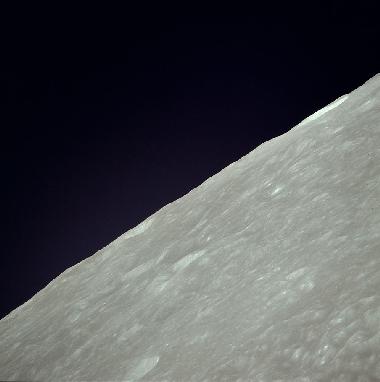-
 Bruce McCandless (CAPCOM)
Bruce McCandless (CAPCOM)
-
Apollo 11, Apollo 11, this is Houston. We are reading you weakly. Go ahead. Over.
-
 Neil Armstrong (CDR)
Neil Armstrong (CDR)
-
Roger. Burn status report follows. DELTA-TIG zero, burn time 557, … VGX minus O.1, VGY minus 0.1, VGZ plus 0.1, DELTA-VC minus 0.390, fuel, plus 3 … 42. Over.
-
 Unidentified crew member
Unidentified crew member
-
… VGX minus 0.1, VGY minus 0.1, VGZ 1.1, and a burn time of 5 plus 57. Stand by, maybe the COMM will improve a little bit. Over.
-
 Bruce McCandless (CAPCOM)
Bruce McCandless (CAPCOM)
-
Apollo 11, this is Houston. Are you in the process of acquiring data on the burn? Over.
-
 Bruce McCandless (CAPCOM)
Bruce McCandless (CAPCOM)
-
Roger. Reading you the same, now. Could you repeat your burn status report? We copied the residuals and burn time, and that was about it. Send the whole thing again, please.
-
 Neil Armstrong (CDR)
Neil Armstrong (CDR)
-
It was like—like perfect! DELTA-TIG zero, burn time 557, shaft value on the angles, VGX minus 0.1, VGY minus 0.1, VGZ plus 0.1, no trim, minus 6.8 on DELTA-VC, fuel was 38.8, LOX 39.0, plus 50 on balance, and we ran an increase on the PUGS, NOUN 44 showed us in a 60.9 by 169.9.
-
 Bruce McCandless (CAPCOM)
Bruce McCandless (CAPCOM)
-
Roger. We copy your burn status report. And the spacecraft is looking good to us on telemetry.
-
 Neil Armstrong (CDR)
Neil Armstrong (CDR)
-
Apollo 11 is getting its first view of the landing approach. This time we are going over the Taruntius crater, and the pictures and maps brought back by Apollo 8 and 10 have given us a very good preview of what to look at here. It looks very much like the pictures, but like the difference between watching a real football game and watching it on TV. There's no substitute for actually being here.
-
 Buzz Aldrin (LMP)
Buzz Aldrin (LMP)
-
We're going over the Messier series of craters right at the time, looking vertically down on them, and Messier A we can see good sized blocks in the bottom of the crater. I don't know what our altitude is now, but in any case, those are pretty good size blocks.
-
 Bruce McCandless (CAPCOM)
Bruce McCandless (CAPCOM)
-
Okay. Just roughly, it looks like you are about 120 miles or 130 miles right now—make that 127 miles.
-
 Bruce McCandless (CAPCOM)
Bruce McCandless (CAPCOM)
-
Roger. Thank you. And our preliminary tracking data for the first few minutes shows you in a 61.6 by 169.5 orbit. Over.
-
 Bruce McCandless (CAPCOM)
Bruce McCandless (CAPCOM)
-
11, Houston. During your SPS burn as played back on tape down here, we've observed the nitrogen tank Bravo pressure in the SPS system dropping a little bit more than we anticipated. It's holding steady right now. We'll continue to watch it and keep you posted if anything comes up. Over.
-
 Neil Armstrong (CDR)
Neil Armstrong (CDR)
-
And Boothill, Duke Island, Sidewinder, looking at Maskelyne W, that's the yaw round checkpoint, and just coming into the terminator. At the terminator it's ashen and gray. As you get further away from the terminator, it gets to be a lighter gray, and as you get closer to the subsolar point, you can definitely see browns and tans on the ground, according to the last Apollo 11 observation anyway.
Expand selection up Expand selection down Close -
 Neil Armstrong (CDR)
Neil Armstrong (CDR)
-
And landing site is well into the dark here. I don't think we're going to be able to see anything of the landing site this early.
-
 Bruce McCandless (CAPCOM)
Bruce McCandless (CAPCOM)
-
Apollo 11, this is Houston. When you have a free minute, could you give us your onboard readout of N2 tank Bravo, please. And we'd like to make sure you understand that ever since you stopped thrusting with the SPS, the temperature in this tank has remained steady. Over. Make that the pressure has remained steady.
-
 Buzz Aldrin (LMP)
Buzz Aldrin (LMP)
-
Roger. We're showing the N2 tank pressure and the tank Bravo to he 1960, something like that, and Alfa is, oh, about 2250. Over.
-
 Michael Collins (CMP)
Michael Collins (CMP)
-
Houston, Apollo 11. How about coming up with some roll, pitch, and yaw angles in which to stop this so called ORB RATE that I'm doing.
-
 Bruce McCandless (CAPCOM)
Bruce McCandless (CAPCOM)
-
Roger. We show you, in the flight plan, staying in orbital rate until about 79 hours 10 minutes. Do you have some particular attitude or reason for wanting to go inertial? Over.
Spoken on July 19, 1969, 6:14 p.m. UTC (56 years, 2 months ago). Link to this transcript range is: Tweet


